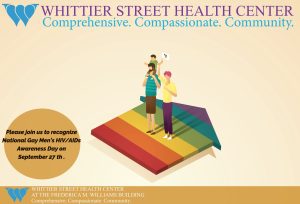Blog
National Gay Men’s HIV/AIDs Awareness Day
National Gay Men’s HIV/AIDs Awareness Day (NGMHAAD) is recognized annually on September 27 to call attention to the disproportionate impact of HIV/AIDs and its associated stigma on gay and sexual minority men. This annual day of observance was declared in 2008 by the National Association of People with AIDs (NAPWA), a nonprofit patient advocacy organization that originated with the AIDs activist movement in the United States. First established in 1983, NAPWA is the largest and oldest advocacy group of people living with HIV/AIDs, founded to center the experiences and needs of people with HIV/AIDs in treatment and health policy reform initiatives. Besides NGMHAAD, NAPWA was responsible for introducing World HIV Testing Day on June 27th— another observance that Whittier proudly honors today.
At the height of the AIDs epidemic in the early 1980s, NAPWA rallied to not only fight against the adverse health and life consequences of HIV, but to change the public perception and stigma associated with the diagnosis. When HIV was first discovered in 1981, public health authorities wrongly labeled it as an exclusively “gay disease,” fueling discrimination against men who had sex with men (MSM) and erasing the experiences of others living with HIV, including men and women of different sexual orientations and injection drug users. Even though HIV can affect people of any gender or sexual orientation, this framing of the disease intensified homophobic prejudice and, for years, stalled necessary developments in HIV-related research and access to prevention, treatment, and support services.
Today, HIV remains a pressing public health issue that impacts people of all identities, but it continues to disproportionately impact LGBTQ+ communities—particularly Black and Latino gay and bisexual men. According to the CDC, in 2022, Black/African American and Hispanic/Latino gay and bisexual men accounted for nearly 73% of new HIV infections among MSM. Research shows that these groups are also less likely to know their HIV status compared to their white counterparts. These disparities underscore the importance of expanding awareness and access to life-saving HIV testing, prevention, and treatment services across sexual and racial/ethnic minority groups.
At Whittier Street Health Center, we are committed to reducing the burden of HIV among those most affected while ensuring that everyone in our community has access to the tools they need to protect their health. Our Infectious Disease and Special Populations department provides confidential HIV testing and linkage to care, including pre-exposure prophylaxis (PrEP) and post-exposure prophylaxis (PEP) medications, ongoing treatment for those living with HIV, and support services to address stigma and other barriers to care impacting marginalized populations.
On Friday September 26th, we invite you to join us for National Gay Men’s HIV/AIDS Awareness Day from 12pm-1pm where we will share information about on-site HIV testing, prevention resources, and linkage to care and support services at Whittier. We stand in solidarity with LGBTQ+ patients in our efforts to curb the spread and stigma of HIV and close the gap in health disparities facing underserved communities. For more information about HIV testing, prevention, and treatment services at Whittier, contact our Testing Line at (617) 308-0060.
